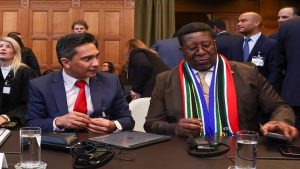South Africa’s climate change program is on track, at least for now. But, that might not be sustainable if change doesn’t happen at a quicker rate in the energy and transport sectors. South Africa’s First Climate Change Report will be released next month. And next year the country will have to submit its latest Nationally Determined Contribution targets to the United Nations, part of the responsibility of being a signatory to the Paris Climate Change Agreement.
There’s a presumption that South Africa is failing to make changes rapidly enough because our big greenhouse gas emitters – energy and transport – don’t seem to be adapting or planning ahead. But that is only partly true. And those two are not the only guilty parties.
At the most recent Presidential Climate Commission meeting last week, Brian Mantlana, one of the commissioners and also the leader of the Holistic Climate Change Impact Area at the CSIR, said: “There are three major sectors that South Africa needs to pay attention to … one is electricity, one is industry which is dominated by Sasol, and the third one is transport… In my view, we are struggling to mitigate emissions from the transport sector, and they are on the upward trend.”
There’s been little movement in the transport market, in a country without a reliable countrywide public transport system. A big first step would be to get PRASA functional again. Taking trucks and long-distance human transport off the roads would do much to help mitigate emissions. Transport also needs to ramp up the changes to our vehicle manufacturing sector, so that jobs are not lost. As the rest of the world moves towards electric vehicles, a sector that provides massive employment needs to adapt to the times.
The energy sector, responsible for 78% of greenhouse gas emissions, is dominated by the supply of electricity. This is vital to the economy and to the people of South Africa and their welfare. Eskom recently confirmed that it is extending the life of three coal power stations. The private sector is rolling out significant renewable energy for its own use, and some have presumed this is the reason for the recent long period of no load-shedding. But Eskom CEO Dan Marokane told the PCC that is not entirely true. He says Eskom has not lost customers in recent months, and that Eskom is also making strides in rolling out its own renewable energy projects, as well as easing the ability of private generators to sell excess power and add it to the national grid. But he stressed it is necessary to slow the move away from coal to make sure electricity remains available, and he says the cost analysis makes it a viable option.

There have been suggestions that the recent lack of load-shedding was an election ploy. That’s another debate, but the point is, as PCC vice-chairman Valli Moosa pointed out, almost half the world’s population is voting this year, and climate change is not an issue anywhere.
“We could live in a little fool’s paradise of our own, and it doesn’t matter what we say because nobody’s (listening). The work which we do must be based on what is in our interest”. And that he says it to serve both the people and the climate. The PCC has many commissioners for whom climate justice is the fight, saving the planet but not at the expense of people’s livelihoods.
This is also the focus of the Just Energy Transition process, and the report will detail not only what we need to do, but how to do it without losing jobs, and still reach our targets in the global fight to get the world to net zero, where necessary carbon emissions are off-set by carbon gains, by 2050. South Africa is not one of the bad guys in terms of emissions, but recent floods and droughts, even tornadoes, have shown that we are amongst the most vulnerable to the effects.
The argument always comes back to the economy and jobs. Can South Africa afford to do what needs to be done for the climate? The answer is simple – it can’t afford not to. And not, as many believe, because we’ve signed global agreements. One of the PCC’s working groups has established that if South Africa reached Net Zero by 2030, but the rest of the world went about things business as usual, our GDP would rise by 8.6%, and if things are reversed and South Africa makes no changes, it will shrink by over 4%. If both the world and the country reach their targets, our GDP still increases by 2.5%, and that’s good news both people and planet.
The surprise so far this year, known as the ‘year of elections’ globally, is that climate change is not a campaign issue, anywhere. In South Africa, fighting load-shedding was a part of many party manifestos, but few said anything about climate change. Many parties did the opposite and argued that South Africa should increase our coal-power capacity because that increases jobs. But the taxes and tariffs that will be imposed on agricultural and manufacturing exports as a result will be crippling within a decade, so the gains are short-sighted in the extreme.
The Presidential Climate Commission includes the President as chairman, with 13 different Ministers also as Commissioners. They will have to wait for a new Cabinet to be announced to see how the next government deals with the issues, particularly with regard to financing. But the PCC has made strides in all the key areas and with a focus on the ‘Just’ part of the transition process, South Africa can benefit economically and take small steps in mitigating and adapting to the climate crisis which has seen communities and lives devastated by increasingly frequent weather extremes.






